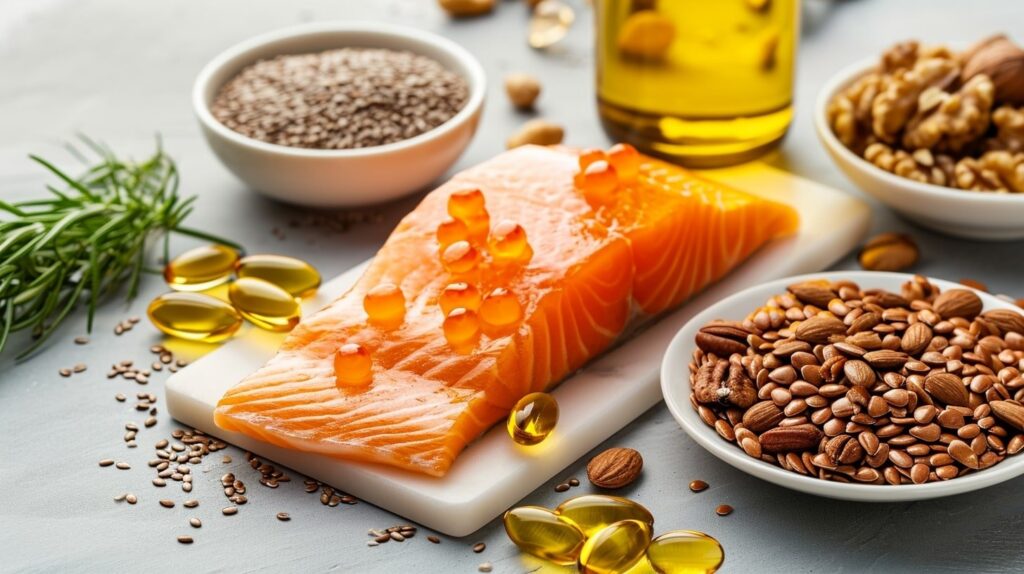Table of Contents
In our quest for a healthy heart, the role of diet cannot be overstressed. Among the myriad of nutrients essential for cardiovascular health, omega-3 fatty acids stand out for their remarkable benefits. Known for their power to enhance heart health, reduce the risk of arrhythmias, and lower triglyceride levels, omega-3s are a must-have in your dietary arsenal. Whether you’re a seafood aficionado or a plant-based enthusiast, there are rich sources of omega-3s just waiting to be discovered. Let’s dive into the world of fatty fish like salmon, mackerel, and sardines, and explore plant-based alternatives such as flaxseeds and walnuts. Get ready to reel in the heart health benefits with this essential guide!
Reel in Heart Health Benefits!
Omega-3 fatty acids are not just another dietary fad; they are backed by substantial scientific research showcasing their importance in maintaining a healthy heart. According to the American Heart Association, omega-3 fatty acids have been shown to improve heart health by decreasing the risk of coronary heart disease, reducing blood pressure in individuals with hypertension, and slowing the development of plaque in the arteries. These polyunsaturated fats are vital for your heart’s well-being, and yet, the body cannot produce them on its own, making it essential to source them from your diet.
The consumption of fish rich in omega-3s has been linked to a lower risk of fatal heart attacks. In fact, a study published in the Journal of the American Medical Association found that individuals who ate one to two servings of fish per week had a 36% lower risk of dying from heart disease. This makes including omega-3-rich fish in your diet a smart move for anyone looking to protect their heart.
When planning your meals, aim to incorporate fish with high levels of omega-3s like salmon, mackerel, and sardines at least twice a week. These fish not only contribute to heart health but also provide a delicious and versatile option for various culinary creations. By using the ‘My Heartlet’ app, you can track your omega-3 intake and find heart-healthy recipes that make it easy to enjoy these nutritious fish.
Hooked on Omega-3 Rich Fish!

Diving into the specifics, let’s highlight some of the most beneficial fish for omega-3 intake. Salmon, known for its rich, tender flesh, is not only a culinary delight but also a prime source of EPA and DHA, the types of omega-3s best known for heart health benefits. Wild-caught salmon is often recommended as it tends to have higher levels of omega-3s and is generally considered more sustainable. Mackerel, another oily fish, is packed with these essential fats and also offers a hefty dose of vitamin D.
Sardines are small but mighty when it comes to their nutrient profile. These tiny fish are usually eaten whole, giving you the added bonus of calcium and vitamin D from their bones. Additionally, the National Institutes of Health suggests that including fish like sardines in your diet can contribute to brain health due to the omega-3 content.
To make the most of these omega-3-rich fish, try incorporating them into your diet in the following delicious ways:
- Grill salmon steaks with a sprinkle of herbs for a simple, heart-healthy meal.
- Toss mackerel into salads for an added protein boost.
- Spread mashed sardines on whole-grain toast for a quick and nutritious snack.
By using the ‘My Heartlet’ app, you can discover more recipes and tips to ensure you’re getting your fill of these omega-3-rich fish, making it a seamless part of your heart-healthy lifestyle.
Vegetarian? Plant-Based Omega-3!
For vegetarians or those who prefer not to eat fish, fear not – there are plenty of plant-based sources rich in omega-3s. Flaxseeds, chia seeds, and walnuts are fantastic alternatives that can easily be incorporated into your daily diet. These sources contain alpha-linolenic acid (ALA), which the body can partially convert to EPA and DHA, the active forms of omega-3s.
To add these plant-based omega-3s to your diet, consider the following tips:
- Sprinkle ground flaxseeds or chia seeds over your morning oatmeal or smoothie.
- Use walnut oil in salad dressings for a nutty flavor and omega-3 boost.
- Snack on a handful of walnuts for a satisfying, heart-friendly treat.
While plant-based sources are beneficial, it’s important to note that the conversion rate of ALA to EPA and DHA is relatively low. As such, vegetarians and vegans might consider algae-based supplements to ensure adequate intake of these critical fatty acids. The ‘My Heartlet’ app can be a valuable resource for tracking your omega-3 levels and finding vegetarian recipes that incorporate these essential nutrients.
Conclusion
Omega-3 fatty acids are a cornerstone of heart health, and including them in your diet is a smart strategy for anyone looking to improve their cardiovascular well-being. Whether you prefer the rich flavors of fatty fish or the versatility of plant-based options, there’s no shortage of ways to enjoy these essential nutrients. Remember to aim for at least two servings of omega-3-rich foods per week and use tools like the My Heartlet app to stay on track with your heart health goals. So go ahead, cast your line, and reel in the myriad of benefits that omega-3 fatty acids have to offer!
